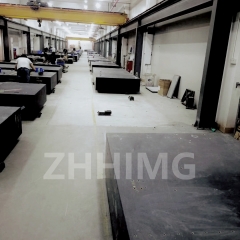Granite Precision Apparatus is a highly refined product which is used in a variety of industries like construction, aerospace, and precision engineering. It is a natural stone that is formed from molten magma under high pressure and temperature. However, even though granite is known for its robustness and durability, it has certain defects which can make it unsuitable for precision apparatus assembly.
One of the primary defects of granite is its porosity. Granite is a natural stone that has microscopic pores, which are created due to its formation process. These pores can lead to sub-surface fractures or cracks on the surface of the granite, which can interfere with the precision apparatus assembly process. This can cause the apparatus to be inaccurate and unreliable, and it can affect the overall quality of the end product.
Another issue with granite is its weight. Although this attribute can be beneficial in some applications, it can also be a major drawback in some cases. For example, in the aerospace industry, where weight is a crucial factor, the use of granite in the precision apparatus assembly could result in additional and unnecessary load on the aircraft, thus increasing fuel consumption and reducing speed.
Moreover, granite can also be susceptible to thermal expansion and contraction. During changes in temperature, granite can expand or contract, which can lead to distortions in the assembly, affecting the accuracy and precision of the apparatus.
Furthermore, granite is not resistant to chemical reactions, and it can deteriorate when exposed to highly acidic or basic solutions. This attribute makes it unsuitable for use in an environment where exposure to chemicals is prevalent, such as in the laboratory or chemical processing plants.
Despite these defects, there are steps that can be taken to mitigate their effects. For example, the use of sealants can reduce the porosity of granite, thereby reducing the chances of sub-surface fractures. The use of lighter materials can also reduce the weight of the apparatus, while thermal expansion can be minimized by using proper thermal management techniques. Additionally, the use of chemical-resistant coatings can safeguard granite from chemical reactions.
In conclusion, although granite is a robust and durable material, it has its defects which can affect the accuracy and precision of the precision apparatus assembly. However, with proper planning, design, and material selection, these defects can be mitigated, and the use of granite can be advantageous in many applications.
Post time: Dec-22-2023

